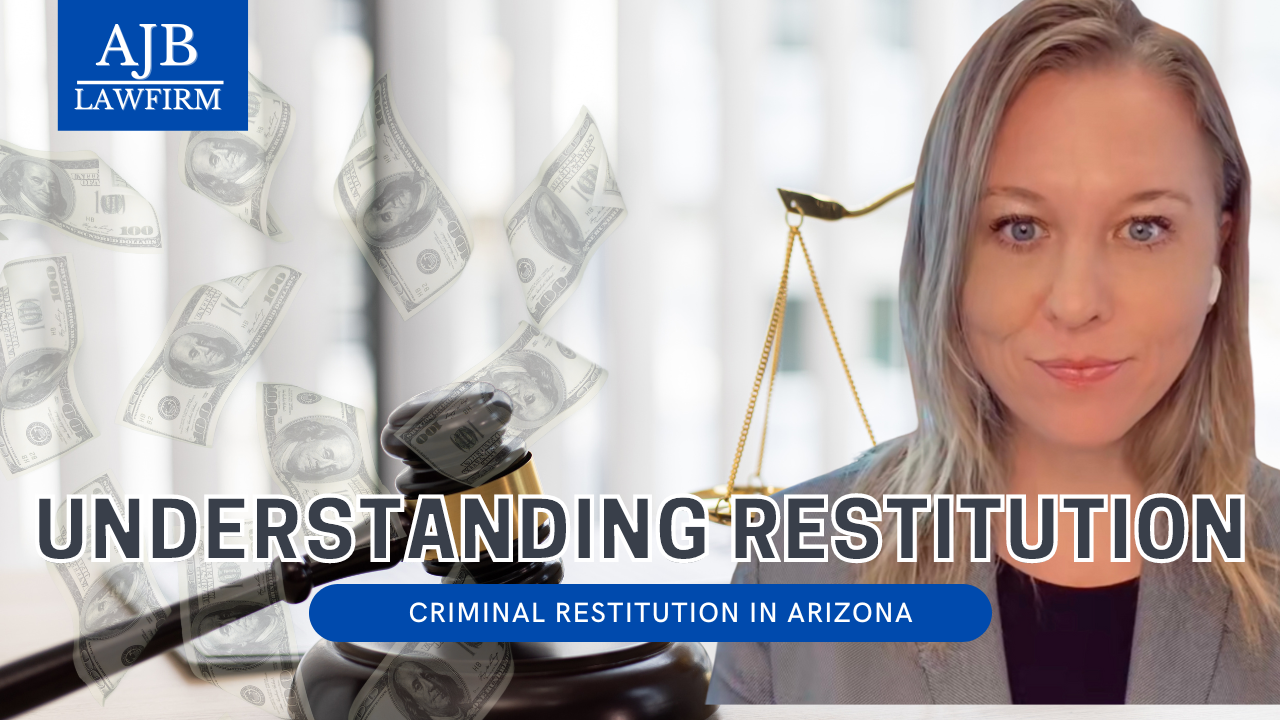Restitution in Criminal Cases in Arizona
What is Restitution?
Criminal restitution is a way to hold a criminal accountable for their actions by making them compensate the victim for the harm they caused. This not only makes the crime worthless to the criminal but also serves to deter them and others from committing similar crimes in the future. The main goal of mandatory restitution is to repair the harm done to the victim and help the offender understand the consequences of their actions. It's a way to make things right and for the offender to take responsibility for their actions.
Restitution in Arizona:
In Arizona, if a person is convicted of an offense, the court requires the convicted person to make restitution (pay) to the person who is the victim of the crime or to the immediate family of the victim if the victim has died, in the total amount of the economic loss as determined by the court and in the manner as determined by the court or the court's designee. Restitution is designed to make the victim whole.
Persons Entitled to Restitution:
Restitution can be awarded “to any person who suffered an economic loss caused by the defendant's conduct.” Restitution of full economic loss to a victim of a crime is mandatory under state sentencing statutes. A loss is recoverable through restitution if it constitutes an economic loss the victim would not have incurred but for the criminal conduct which directly caused the loss. A restitution award must bear a reasonable relationship to the victim's loss.
What Counts as Restitution?
To be recoverable as restitution:
the loss must be economic,
the loss must be one that the victim would not have incurred but for the criminal conduct, and
the criminal conduct must directly cause economic loss.
Limits on Restitution:
Because the purpose of restitution is not to punish but to make the victim whole, trial courts must take care not to compensate victims for more than their actual loss; to do otherwise would upset the relationship among reparation, retribution, and rehabilitation and blur the distinction between criminal restitution and recovery for ancillary damages protected by the civil jury trial.
Restitution is not unlimited. Under the restitution statute, the defendant is only liable for expenses that flow directly from the defendant's criminal conduct without the intervention of additional causative factors. Restitution is not available for monetary expenses incurred as part of a routine function or for consequential damages that are too attenuated from the crime.
What is the burden of proof for restitution?
The burden is on the government to prove the amount of restitution owed by a preponderance of the evidence. Restitution is not an element of the offense nor punishment exacted by the state, but rather is the act of restoring or making a victim whole and, thus, does not require proof beyond a reasonable doubt. The government must prove that a particular loss would not have occurred but for the conduct underlying the offense of conviction and that the causal nexus between the conduct and the loss is not too attenuated factually or temporally.
What counts as Restitution?
Criminal restitution may cover a range of damages a victim has suffered due to the defendant's criminal activity. Here are some examples of damages that may be covered by restitution:
Property damage: If the defendant damaged the victim's property, such as a car, house, or other belongings, restitution may cover the cost of repair or replacement.
Medical expenses: If the victim suffered physical injuries due to the defendant's actions, restitution may cover the cost of medical treatment, hospitalization, and rehabilitation.
Lost wages: If the victim missed work due to injuries sustained during the crime, restitution may cover lost wages or future earning capacity.
Counseling or therapy: If the victim suffered emotional distress or psychological trauma due to the crime, restitution may cover the cost of counseling or therapy sessions.
Funeral expenses: In cases of homicide, restitution may cover funeral expenses for the victim.
Restitution may also cover other out-of-pocket expenses that the victim incurred as a direct result of the defendant's criminal activity.
What should someone do if there is restitution involved in their criminal case?
Hiring an attorney can be a good idea when facing criminal charges and possibly having to pay restitution. An attorney can help you navigate the complex legal system and ensure that your rights are protected throughout the process.
One of the main benefits of hiring an attorney in a restitution case is that they can help you argue for fair and reasonable restitution. Without an attorney, you may not know how to argue against an excessive or unreasonable amount of restitution effectively. Your attorney can help you challenge the prosecution's arguments and present evidence to support your case, which can help ensure that you are not ordered to pay more than what is fair and reasonable.
Additionally, an attorney can help you negotiate a payment plan or settlement agreement that is manageable and does not put an undue financial burden on you. They can also help you understand your legal obligations regarding restitution and ensure you meet all your requirements, such as making timely payments.
Overall, hiring an attorney can help you protect your rights and ensure that you are not unfairly burdened with an excessive amount of restitution. They can provide you with valuable legal guidance and representation throughout the process, which can help you achieve a more favorable outcome in your case.
Owner of AJB Law firm, LLC, Attorney Amanda Bynum is an experienced criminal defense attorney. She has experience dealing with restitution issues in many jurisdictions.
